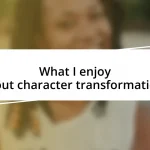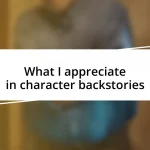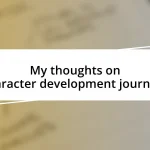Key takeaways:
- Iconic characters reflect our struggles and values, inspiring personal growth and resilience through their journeys.
- Stories from diverse cultural backgrounds promote empathy and understanding, challenging us to reevaluate our perspectives.
- Character arcs, such as those in “Wicked” and “A Man Called Ove,” cultivate deeper empathy by revealing the complexities behind seemingly one-dimensional figures.
- Lessons from characters like Atticus Finch and Hermione Granger encourage advocacy, responsibility, and application of knowledge to foster positive change in daily life.
![]()
Understanding iconic characters influence
Iconic characters often serve as mirrors to our own lives, reflecting our struggles, dreams, and values. I remember watching a particular show where the protagonist faced immense challenges but managed to remain resilient. This character’s journey inspired me to adopt a similar outlook when tackling my own obstacles. Isn’t it fascinating how a fictional persona can lighten our burdens and reshape our responses?
When I think of characters like Atticus Finch from “To Kill a Mockingbird,” I realize how much I’ve adopted his moral compass. His unwavering commitment to justice has prompted me to reevaluate my own values. Have you ever found yourself standing up for something simply because a character you admired made it look admirable? These moments can ignite a profound change in our perspectives, reminding us of the importance of integrity and empathy.
Every time I revisit a beloved book or film, I find myself engaging in introspection, pondering how the lessons from these characters still resonate in my life. For instance, the vulnerability of Frodo Baggins teaches me that even the smallest person can take on the greatest challenges with courage. This emotional connection to storytelling can shape not just our worldview but the way we interact with those around us. How often do we underestimate this subtle yet powerful influence?
![]()
Character traits that resonate deeply
Character traits often resonate with me in unexpected ways. For instance, I learned the importance of compassion through characters like Marge Gunderson from “Fargo.” Her calm demeanor and thoughtful decision-making under pressure remind me to approach my daily challenges with grace. In a world filled with chaos, I find it comforting to embody that same empathy.
Another character that left a significant mark on my outlook is Hermione Granger from the “Harry Potter” series. Her intelligence and determination make me reflect on the value of hard work and loyalty to friends. Whenever I face a difficult situation, I channel her unwavering spirit, knowing that perseverance is often the key to overcoming adversities. Have you ever felt inspired by a character’s strength in moments of doubt?
Moreover, I’m continually drawn to the authenticity embodied by characters like Elizabeth Bennet from “Pride and Prejudice.” Her ability to challenge societal norms and assert her individuality resonates deeply with my own quest for authenticity. It’s these moments of recognition that make me strive for personal growth, pushing me to live my truth unapologetically. Characters can genuinely guide us in shaping our identities by providing a framework for understanding ourselves.
| Character Trait | Character Example |
|---|---|
| Compassion | Marge Gunderson (“Fargo”) |
| Determination | Hermione Granger (“Harry Potter”) |
| Authenticity | Elizabeth Bennet (“Pride and Prejudice”) |
![]()
Life lessons from fictional heroes
There’s something incredibly impactful about the resolve of fictional heroes. Take Spider-Man, for example. His motto, “With great power comes great responsibility,” struck me hard during my teenage years. I remember feeling overwhelmed with choices about my future, but his journey taught me that it’s crucial to take ownership of my actions and their consequences. This simple yet profound lesson nudged me towards making decisions that align with my values, guiding me to contribute to my community in meaningful ways.
I’ve also gleaned insights from characters facing adversity, like Katniss Everdeen from “The Hunger Games.” I vividly recall watching her defy oppressive systems. Her bravery inspired me to voice my beliefs, especially in situations where silence seemed easier. It helped me understand that standing up for what’s right often requires personal sacrifice but can lead to transformative change in the world around us. Here are some key life lessons I’ve learned from these fictional heroes:
- Responsibility: Embracing the idea that my choices impact others.
- Courage: Finding the strength to speak up against injustice, even when it’s uncomfortable.
- Resilience: Persisting through challenges and setbacks, drawing strength from inner convictions.
- Integrity: Staying true to one’s values in the face of societal pressure.
These lessons have resonated with me deeply and continue to shape how I navigate my own life.
![]()
Cultural perspectives through storytelling
Stories hold a mirror to society, reflecting diverse cultural perspectives that shape our understanding of one another. When I immersed myself in stories from different backgrounds, like the poignant tales from “The Joy Luck Club,” I found myself empathizing with characters whose experiences diverged from my own. This exposure challenged me to consider life through their eyes, revealing the richness of various cultural narratives and the common threads that bind us all. Isn’t it fascinating how a single story can resonate across continents?
Through storytelling, I’ve learned that even fictional contexts can provide profound insights into real-world issues. For instance, while reading “Things Fall Apart” by Chinua Achebe, I experienced the deep-seated conflicts between tradition and change in a way that grounded historical events in human emotions. It made me reflect on how cultural heritage influences our identity and choices. Have you ever felt a character’s struggle resonating so deeply that it changed the way you view your own life?
Moreover, I cherish the perspectives brought forth by comics and graphic novels, like “Persepolis” by Marjane Satrapi. They articulate cultural perspectives through a blend of visual art and narrative, providing immense depth to personal and collective history. I recall feeling a surge of empathy while navigating Marjane’s journey, which depicted her struggles against political oppression in Iran. It served as a reminder that our world is layered and complex, intertwining personal stories with broader cultural experiences. The way stories transcend borders challenges us to embrace differences and find common ground. Isn’t it enlightening to see how storytelling truly enriches our worldview?
![]()
Transforming personal beliefs through narratives
Narratives have a remarkable ability to reshape our beliefs and values, often without us even realizing it. During my high school years, I stumbled upon “To Kill a Mockingbird.” The character of Atticus Finch stood out for his unwavering commitment to justice. His moral courage nudged me to reconsider my views on empathy and fairness, prompting me to interact with my peers in a more understanding way. I found myself asking, “How can I uphold justice in my own small circle?” And through his story, I discovered that even the smallest acts of kindness can ripple outwards.
As I delved into magical realism through Gabriel García Márquez’s “One Hundred Years of Solitude,” I found my perspective on family and fate transformed. The narrative’s blend of the fantastical and the everyday made me appreciate the intricate connections in my own family dynamics. I often reflect on how the weights of history influence our decisions today. Has a story ever made you reconsider your inherited beliefs? It’s incredible how the lives of these characters can mirror the complexities of our reality, urging us to reevaluate what we accept as true.
Characters often present both virtues and flaws, which can resonate like echoes of our own struggles. Take, for instance, the character of Holden Caulfield from “The Catcher in the Rye.” His cynicism and search for authenticity struck a chord within me during my late adolescence. I realized that navigating authenticity in a seemingly superficial world was a shared challenge. Reading about Holden’s inner turmoil made me reflect on how I choose to express my identity amidst societal expectations. It’s a potent reminder of how narratives can bridge personal experience and broader human struggles, prompting real transformations in beliefs.
![]()
Developing empathy through character arcs
Character arcs offer profound opportunities to cultivate empathy. When I think of characters like Elphaba from “Wicked,” I can’t help but reflect on how her journey shaped my understanding of societal prejudice. Witnessing her struggles against judgment and her quest for acceptance made me question how often I see people as one-dimensional instead of recognizing their complex narratives. How often do we rush to conclusions about others without considering their backstories?
In novels like “A Man Called Ove” by Fredrik Backman, we’re invited to witness the transformation of a seemingly irritable character. I found myself initially feeling frustration toward Ove’s gruff demeanor, only to discover the layers of pain and loss he carried. This revelation sparked a deep sense of compassion in me. Have you ever looked beyond a character’s exterior to find common human vulnerabilities hidden underneath? It’s a powerful reminder of how everyone has their battles.
Engaging with characters who evolve through hardship often mirrors our own life experiences. I remember my journey seeing parallels in “The Fault in Our Stars” with Hazel Grace, who navigated her relationship with illness and love. Her resilience encouraged me to empathize with those grappling with difficult circumstances. Every arc teaches us something valuable about the human condition, nudging us to open our hearts a little wider. Isn’t it enlightening how character journeys can challenge us to grow alongside them?
![]()
Applying lessons in daily life
When I think about applying lessons from iconic characters in my day-to-day life, I often recall Frodo Baggins from “The Lord of the Rings.” His journey of carrying the Ring resonated with me during a particularly challenging time in my career. Much like Frodo’s burdensome quest, I found myself grappling with the pressures of expectations. I frequently asked, “What strength lies in vulnerability?” This realization pushed me to face my challenges head-on, reminding me that it’s okay to seek support while embarking on my personal journeys.
I also reflect on the character of Hermione Granger from the “Harry Potter” series. As a student, her fierce commitment to learning and unwavering loyalty inspired me to embrace my own academic pursuits with vigor. I often find myself asking, “Am I applying my knowledge to help others?” This question leads me to volunteer in my community, applying what I know to make a difference in tangible ways. Hermione taught me that knowledge, combined with action, can truly empower change.
Then, there’s the character of Atticus Finch once again. His belief in justice transcends the confines of the page and nudges me toward advocacy in my daily interactions. When I witness unfair treatment, I sometimes hear his voice in my head, urging me to speak out. It makes me reflect on my choices: “How can I represent those without a voice?” This awareness has shaped my approach to even the smallest interactions, reminding me to stand firm in my values and contribute to a fairer world in every situation I encounter.





